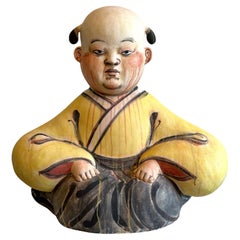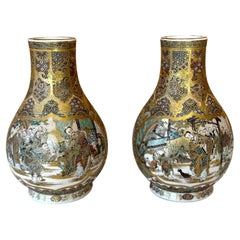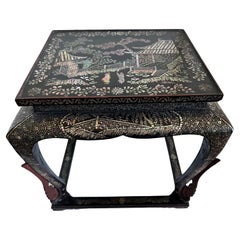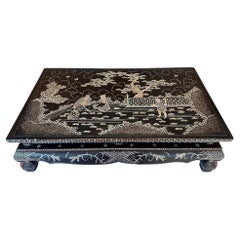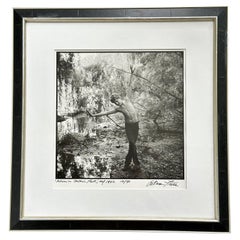TISHU
to
36
644
340
213
188
173
169
123
115
85
68
64
51
49
46
36
35
33
30
27
26
24
23
18
17
16
15
15
9
8
5
2
2
1
1
1
39
27
18
15
15
Important Ceramic Sculpture Karako by Akio Takamori Exhibited and Published
By Akio Takamori
Located in Atlanta, GA
Large figurative ceramic sculpture entitled "Karako" by Akio Takamori (1950 - 2017) created in 2005. Stoneware with hand-painted surface, the sculpture depicts a berobed boy in a sit...
Category
Early 2000s American Modern Figurative Sculptures
Materials
Ceramic
Pair of Fine Miniature Satsuma Vase with Moriage Enamel Decoration by Seikozan
Located in Atlanta, GA
A pair of small ceramic vases with superb surface decorations made by Japanese studio Seikozan circa 1890-1910s (late Meiji Period). One of the many artist studios that specialized i...
Category
Antique 1890s Japanese Meiji Ceramics
Materials
Ceramic
Antique Japanese Lacquer and Inlay Table from Ryukyu Islands
Located in Atlanta, GA
A small square-form table with lacquer and intricate mother-of-pearl inlay design from Ryukyu Islands kingdom circa 17-18th century. Ryukyuan kingdom was used to be an independent is...
Category
Antique 18th Century Japanese Edo Lacquer
Materials
Mother-of-Pearl, Lacquer
Antique Japanese Lacquer and Inlay Kang Table from Ryukyu Island
Located in Atlanta, GA
A small low table with lacquer and intricate mother-of-pearl inlay design from Ryukyu Islands kingdom circa 17-18th century. Ryukyuan kingdom was used to be an independent island cou...
Category
Antique 18th Century Japanese Edo Lacquer
Materials
Mother-of-Pearl, Lacquer
Framed Editioned Dali Photograph by Philippe Halsman
By Philippe Halsman
Located in Atlanta, GA
Artist: Philippe Halsman (1906-1979)
Medium: Gelatin silver print
Title: Dali Fishing
Date: 1954; Printed in 1981 as part of the ten-piece Dali Portfolio...
Category
Vintage 1950s American Modern Photography
Materials
Wood, Paper
Framed Editioned Vintage Photograph Adam in Central Park New York Arthur Tress
By Arthur Tress
Located in Atlanta, GA
A framed black and white gelatin silver photograph by American surrealist photographer Arthur Tress (1940-). Entitled "Adam in Central Park, New York". the gelatin silver print was m...
Category
Late 20th Century American Modern Photography
Materials
Wood, Paper
Framed Edition Dali Photograph by Philippe Halsman
By Philippe Halsman
Located in Atlanta, GA
Artist: Philippe Halsman (1906-1979)
Medium: Gelatin Silver Print
Title: Invisible Dali
Date: 1954; Printed in 1981 as part of the ten-piece Dali Portfolio...
Category
Vintage 1950s American Modern Photography
Materials
Wood, Paper
Pair of Framed Fine Chinese Antique Embroidery Panels with Forbidden Knots
Located in Atlanta, GA
A pair of framed antique Chinese embroidery textile panels circa 19th century of Qing Dynasty. Each piece features two mirror-matchin...
Category
Antique 19th Century Chinese Qing Textiles
Materials
Brocade, Silk, Giltwood
Large Exceptional Japanese Ceramic Moriage Moon Flask Vase Meiji Kinkozan
By Kinkozan
Located in Atlanta, GA
A large and rare Japanese ceramic vase of exceptional quality from late Meiji period circa 1900-10s by Kinkozan (1645-1927). One of the largest studio manufacturers of the export cer...
Category
Antique Late 19th Century Japanese Meiji Ceramics
Materials
Ceramic
Korean Antique Wood Stacking Nong Cabinets
Located in Atlanta, GA
A two-tier stacking storage cabinet on comforting stand, known as Nong in Korean, circa early 20th century (end of Joseon to Korean Empire Period). Each cabinet is fitted with a pair of paneled doors opening in the center to ample storage. The upper cabinet also has a row of four small drawers on top. The stacking cabinet directly sit directly on top of the support stand. Constructed in pine frame with exposed finger joints, they were simply finished in black lacquer on top and the sides. The facade of the cabinets, however, showcases meticulously chosen persimmon wood panels. The striking wood veneer with the bold black grains were perfectly matched in mirrored fashion. Visually arresting, the dark wood grains appear like bold strokes on an abstract ink painting. The yellow brass hardware is of relatively smaller sizes with subdued motifs in order not to overtake the beauty of the wood. They consist of drawer pulls, corner brackets, petal-form hinges and larger lock plates with cutout coin design. The interior was stripped clean showing the natural wood and some residues of old lining rice paper.
We can trace the Nong cabinet on offer here to the more southern providences of the Korean Peninsula where Persimmon trees grow and were harvested, such as Jeolla Do or Chungcheong Do. The wood was beloved by Korean furniture makers in Yi dynasty and used on eye-catching pieces to emphasize the natural beauty of the wood. Examining the piece, one can see extensive and deep patina incurred from its age and previous use, yet the cabinet remains aesthetically stunning as an antique piece with an unexpected modern flare.
For a similar two-tier chest with near identical configuration, size and wood used, see relic no 007182 in the collection of National Folk Museum of Korea in Seoul. The piece is also illustrated on the cover as well as page 46 of the book "Korean Antique...
Category
Early 20th Century Korean Other Furniture
Materials
Brass
$5,000 / set
Rare Japanese Porcelain Incense Burner with Inlays Makuzu Kozan
By Makuzu Kozan
Located in Atlanta, GA
A porcelain incense burner (koro) made by Japanese potter Makuzu Kozan (also known as Miyagawa Kozan, 1842-1916) circa 1890s-1900s (end of Meiji Period). The koro features an elegant...
Category
Antique Late 19th Century Japanese Meiji Ceramics
Materials
Ceramic
Kinetic Metal Sculpture on Marble Base by C. Jere
By Curtis Jeré
Located in Atlanta, GA
A vintage tabletop sculpture crafted by C. Jere and dated to 1978. The metal sculpture was constructed from chromed steel and brass in an abstract tapering spiral form with curved th...
Category
Vintage 1970s American Mid-Century Modern Sculptures
Materials
Marble, Stainless Steel, Chrome
Japanese Celadon Lidded Vessel Mizusashi by Uichi Shimizu
Located in Atlanta, GA
A ceramic lidded celadon vessel made by Japanese potter Uichi Shimizu (1926-2004) circa post 1980s. The vessel was known as Mizusashi in Japanese and used as a freshwater container t...
Category
Late 20th Century Japanese Modern Ceramics
Materials
Ceramic
American Raku Pottery Vessel by Paul Soldner
By Paul Soldner
Located in Atlanta, GA
A modern pottery vessel by American potter Paul Soldner (1921-2011) circa 1960s. Paul Soldner is renowned for his dedication to develop and further Raku firing in American pottery fi...
Category
Late 20th Century American Organic Modern Vases
Materials
Pottery
Rare Japanese Fireman's Four-Piece Assemble Meiji to Showa Period
Located in Atlanta, GA
A rare four-piece Japanese Fireman's assemble (Shobosho uniform) woven with heavy cotton and decorated with stencil resist dye circa 1890-20s Late Meiji to Showa Period. The assemble...
Category
Vintage 1920s Japanese Meiji Textiles
Materials
Cotton
Contemporary Fiber Art Installation by Chen Qingqing
Located in Atlanta, GA
A fiber art installation by Chinese artist Chen Qingqing (1953-), called "Clothing, from Artificial Artifact Series-Flower" was created in 2004 and purchased from Plum Blossom Galler...
Category
Early 2000s Chinese Organic Modern Contemporary Art
Materials
Fabric, Natural Fiber, Acrylic, Wood
Rare Japanese Floor Screen of Perched Eagles Soga Shohaku Edo period
Located in Atlanta, GA
A rare six-panel Japanese folding floor screen (Byōbu) by Soga Shōhaku (1730-1781) from Edo period. The screen depicts six perched hawk-eagles in various poses positioned in a litera...
Category
Antique 18th Century Japanese Edo Paintings and Screens
Materials
Brocade, Wood, Paper
Carved Wood Māori Wahaika Club New Zeland
Located in Atlanta, GA
A wood club known as Wahaika intricately carved and inlayed with small round shells from New Zealand circa 1920s. The hand-hold club was traditionally used as a close-range combat we...
Category
Early 20th Century New Zealand Tribal Sculptures and Carvings
Materials
Wood
Small Japanese Articulate Crab Jizai Okimono Meiji Period Signed
By Myochin Hiroyoshi
Located in Atlanta, GA
A small copper crab with articulated legs made by Myochin Hiroyoshi in the late Meiji Period circa 1890-1900s. One of the pair (the other one is listed separately LU945044034102, bu...
Category
Early 20th Century Japanese Japonisme Metalwork
Materials
Copper
Large Bespoken Sculpted Steel Table with Slate Top Albert Paley
By Albert Paley
Located in Atlanta, GA
A striking steel and stone table studio-made by American sculptor Albert Paley (1944-). The table heavy and substantial and will be a bespoken center piece and a focal point with its...
Category
1990s American Modern Tables
Materials
Cast Stone, Steel
Korean Pottery Funerary Urn Unified Silla
Located in Atlanta, GA
A terracotta pottery funerary urn with lid from Korea Unified Silla Period, circa 9th century. The jar was in a classic globular form with raised shoulder. Although the surface was u...
Category
Antique 15th Century and Earlier Korean Other Ceramics
Materials
Ceramic
Vintage Japanese Formal Black Silk Kimono with Pheonix Embroidery
Located in Atlanta, GA
A vintage Japanese silk Kuro Tomesode Kimono, circa 1950s-1980s. Kuro Tomesode is a dress for married woman for the most formal occasions, equivalent of the evening gowns in the west. It is overall black, decorated only with patterns of bright colors on the bottom. This kimono has three Mon family crests on the front and back shoulder. It is lined with white silk in its interior. On the front, it features exposed white stitches around neck and breast, a very subtle and elegant touch. The bottom part of the kimono is decorated with an embroidery imagery of two phoenix in flight. The lavish use of gold and polychrome threads and meticulous rendition of the birds contrast greatly with the otherwise sober black background. Pheonix is the mythical bird traditionally represents the Queen or Female Supreme in Chinese culture. Known as Hoo-oo in Japanese, Pheonix is a symbol of good fortune, power and divine wisdom and represents the sun goddess Amaterasu, the Queen of Heaven and Creation, who was believed to be the ancestor of the lines of the Japanese imperial family...
Category
Mid-20th Century Japanese Showa Textiles
Materials
Silk
Collection of Four Persian Glazed Ceramic Oil Lamps
Located in Atlanta, GA
A collection of four Early Persian Glazed Pottery Oil Lamps from an American collection. It consists of three oil lamps with iridescent glaze purportedly from Rhages area, Persia, ci...
Category
Antique 15th Century and Earlier Persian Islamic Ceramics
Materials
Ceramic
Antique Korean Money Chest Ton-Kwe Joseon Dynasty
Located in Atlanta, GA
A Korean top-lid chest on elevated carved legs circa late 19th century of Joseon Dynasty. Known as coin chest (Ton-Kwe in Korean), this type of chest was originally used for storing ...
Category
Antique 19th Century Korean Other Furniture
Materials
Iron
Antique Korean Book Bandaji from Gyeongsang Do
Located in Atlanta, GA
An antique Korean wood Bandaji cabinet from Yecheon area in Gyeongsang Do (southern part of Korean Peninsular) circa late 19th century Joseon Dynasty. This particular Bandaji features a partial drop-down front door and extended top plank with upturned end. The relatively plain hardware indicates that its origin was likely from the Northern part of the Gyeongsang Do. The construction suggests that the use of the piece might be to store books or manuscript, known as Ch'aek Bandaji. The cabinet was made from stained pine wood and fitted with black iron hardware. It is supported on carved curvy legs...
Category
Antique Late 19th Century Korean Other Furniture
Materials
Iron
Antique Korean Bandaji Changhung Type from Jeolla Do
Located in Atlanta, GA
An antique Bandaji chest from Korea circa late 19th century Joseon Dynasty. The relatively small open-front cabinet was constructed from stained elm wood and fitted with thin hammere...
Category
Antique 19th Century Korean Other Furniture
Materials
Iron
Antique Korean Small Wood Box Joseon Dynasty
Located in Atlanta, GA
A small Korean antique box circa late 19th century of Joseon Dynasty. The square form box was constructed with thick hardwood planks on all side (appears to be elm) with a noticeable...
Category
Antique 19th Century Korean Other Furniture
Materials
Brass
Antique Korean Mirror and Cosmetic Box
Located in Atlanta, GA
A mirror and cosmetic box known as Gyeongdae from Korea circa early 20th century of late Joseon to Korean Empire to colonial period. This type of small and elegant cabinet belongs personally to a lady for her makeup need. The upper part opens to a folding mirror that stands to a total measurement of 12.5 inches. The lower part consists of a single drawer to store the small accessories. The surface of this box is covered with Zelkova wood veneer with an expressive and eye-catching grains, contrasting nicely with yellow brass hardware that includes corner plates, butterfly shape hinges, a drawer pull and a square lock plate that opens when the brass knob is pushed forward.
During Joseon Dynasty, this type of mirror box became popular, starting from the loyal families to the wealthy household.
For a similar mirror and cosmetic box in the collection of Weisman Art Musuem, see illustration 63 on page 72 of "Traditional Korean Furniture" by Edward Reynolds Wright and Man Sill Pai.
Another example in the collection of National Folk Musuem of Korea is illustrated on page 68 of "Korean Antique...
Category
20th Century Korean Other Furniture
Materials
Brass
Rare Very Large Australian Aboriginal Painting by Kathleen Petyarre
By Kathleen Petyarre
Located in Atlanta, GA
A significant contemporary aboriginal painting by Kathleen Petyarre (1940-2018) in 2010. The painting was a rare oversize piece, exceptionally executed in earthy colors, showcasing m...
Category
2010s Australian Modern Paintings
Materials
Canvas, Acrylic
Framed Cyanotype Photograph by John Patrick Dugdale
By John Dugdale
Located in Atlanta, GA
Artist: John Patrick Dugdale (New York, b. 1960)
Title: Margie
Medium: Cyanotype
Year: 1996
Edition: number 2/10
Measurement: Sight H 9", W 7.5"; with artist fame H 14.5", W 12.5"
Pr...
Category
1990s American Modern Photography
Materials
Wood, Paper
Lucite Lounge Chair with Pillow by Vladimir Kagan
By Vladimir Kagan
Located in Atlanta, GA
A lounge chair constructed in upholstered wood frame flanked by thick Lucite plank arm with exposed brass hardware, this bespoken model was a design attributed to Vladimir Kagan (192...
Category
Vintage 1970s American Mid-Century Modern Lounge Chairs
Materials
Brass
Antique Japanese Tsubo Jar with High Relief Crab Design
Located in Atlanta, GA
A Japanese stoneware tsubo (storage jar) circa 19th century (Meiji period), likely made in one of the Shigaraki or Echizen kilns. The jar has a thick robust body, and a short-neck ri...
Category
Antique 19th Century Japanese Meiji Ceramics
Materials
Ceramic
Rare Japanese Porcelain Painted Footed Dish Makuzu Kozan
By Makuzu Kozan
Located in Atlanta, GA
A rare footed dish in the form of an open scroll painting with literati landscape from the studio of Japanese Potter Makuzu Kozan. Also known as Miyagawa Kozan (1842–1916), Makuzu wa...
Category
Antique Early 1900s Japanese Meiji Ceramics
Materials
Porcelain
Large Contemporary Japanese Bamboo Sculptural Basket Kawano Shoko
By Kawano Shoko
Located in Atlanta, GA
A beautiful bamboo sculpture in an Ikebana basket form by contemporary Japanese bamboo artist Kawano Shoko (born 1957-). The piece was made in 2005 and purchased from Tai Modern in 2...
Category
Early 2000s Japanese Organic Modern Sculptures and Carvings
Materials
Bamboo, Rattan
Pair of Korean Lacquer Wood Stacking Nong Cabinets with Striking Inlays
Located in Atlanta, GA
A fine pair of two-tier stacking cabinets, known as Nong in Korean, circa early 20th century (Korean Empire to Japanese Colonial Period). The square cabinet each is fitted with a pai...
Category
Early 20th Century Korean Other Furniture
Materials
Brass
Lacquered Korean Low Coffee Table with Elaborate Inlays
Located in Atlanta, GA
A Korean black lacquered wood low table with elaborate inlay works circa late Joseon dynasty (late 19th century to turn of 20th century). The low table, supported by slightly curved ...
Category
Antique Late 19th Century Korean Other Furniture
Materials
Brass
Framed Japanese Antique Embroidery Sennin Tapestry Meiji Period
Located in Atlanta, GA
A stunning Japanese embroidery tapestry circa 1880s-1900s from late Meiji period, presented with an original wood frame with inner gold trim. The tour-de-force embroidered tapestry s...
Category
Antique 1890s Japanese Meiji Textiles
Materials
Silk, Giltwood
Large Japanese Kazaribako Glass Box Ancient Captial Kyohei Fujita
By Kyohei Fujita
Located in Atlanta, GA
A Kazaribako "Ornamented Box" made of glass by Japanese artist Kyohei Fujita (1921-2004) circa 1990s. The hand-blown glass box is substantial in size and weight. It features a hexago...
Category
1990s Japanese Modern Glass
Materials
Silver
Japanese Kazaribako Glass Box Rare Hagoromo Kyohei Fujita
By Kyohei Fujita
Located in Atlanta, GA
A brilliant Kazaribako "Ornamented Box" made of glass by Japanese artist Kyohei Fujita (1921-2004) circa 1990s. The hand-blown green glass box featur...
Category
1990s Japanese Modern Glass
Materials
Silver
Framed Editioned Photograph Homage to Cavafy Series by Duane Michals
By Duane Michals
Located in Atlanta, GA
An editioned gelatin silver print by American photographer Duane Michals (1932-). "I could read it clearly in his palm. There would be a terrible tragedy. My love could not protect him" from Homage to Cavafy Series, published in 1978. Gelatin silver print, hand-written titled on the lower margin. Signed and numbered 8/25 in ink on the bottom of the sheet (as shown). 3 1/2 x 5" for the image size. Displayed in a brand-new black wood archive frame with museum glass.
Michals created ten photographs in honor of Greek gay...
Category
Vintage 1970s American Modern Photography
Materials
Wood, Paper
Framed Editioned Photograph Homage to Cavafy Series by Duane Michals
By Duane Michals
Located in Atlanta, GA
An editioned gelatin silver print by American photographer Duane Michals (1932-). "After his shower, he dried himself very carefully. and although he would never admit it, it had all been done for my benefit" from Homage to Cavafy Series, published in 1978. Gelatin silver print, hand-written titled on the lower margin. Signed and numbered 8/25 in ink on the bottom of the sheet (as shown). 3 1/2 x 5" for the image size. Displayed in a brand-new black wood archive frame with museum glass.
Michals created ten photographs in honor of Greek gay...
Category
Vintage 1970s American Modern Photography
Materials
Wood, Paper
Framed Editioned Photograph Homage to Cavafy Series by Duane Michals
By Duane Michals
Located in Atlanta, GA
An editioned gelatin silver print by American photographer Duane Michals (1932-). "Just to light his cigarette was a great pleasure" from Homage to Cavafy Series, published in 1978. Gelatin silver print, hand-written titled on the lower margin. Signed and numbered 8/25 in ink on the bottom of the sheet (as shown). 3 1/2 x 5" for the image size. Displayed in a brand-new black wood archive frame with museum glass.
Michals created ten photographs in honor of Greek gay...
Category
Vintage 1970s American Modern Photography
Materials
Wood, Paper
Rare Korean Ceramic Brush Holder Joseon Dynasty
Located in Atlanta, GA
A rare Korean porcelain brush holder in Banana Leaves pattern from late Joseon dynasty circa 19th century. Cherished by the scholars, this brush...
Category
Antique 19th Century Korean Other Ceramics
Materials
Ceramic
Fine Japanese Satsuma Vase with Superb Decoration by Seikozan
Located in Atlanta, GA
A ceramic vase in tapered square form made by Japanese studio Seikozan circa 1890-1910s (late Meiji Period). One of the many artist studios that specialized in satsuma ware, Seikozan...
Category
Antique 1880s Japanese Meiji Ceramics
Materials
Ceramic
Japanese Glazed Ceramic Bowl by Makuzu Kozan
By Makuzu Kozan
Located in Atlanta, GA
Tri-pod ceramic bowl likely used as an incense burner (koro) by Japanese Imperial potter Makuzu Kozan (1842-1916) circa late Meiji period. The signature indicates that it was produce...
Category
Antique 1880s Japanese Meiji Ceramics
Materials
Ceramic
Fine Japanese Satsuma Ceramic Jar with Gilt Decoration by Kinkozan
By Kinkozan
Located in Atlanta, GA
A large Japanese ceramic vase from end of Meiji period circa 1880s- 1910s by Kinkozan (1645-1927). One of the largest studio manufacturers of the export ceramics at the time based in Kyoto. In the typical style of satsuma made at the turn of 20th century, the vase is of a moon jar shape and finely decorated with kinran-de (gold paint) on a cream white background with even fine crackles. What sets this particular vase apart from many lower quality and mass-produced pieces is the meticulously renditioned surface decoration. Lavishly gilded with a continuous design, the carefully composed imagery depicts an elaborately decorated float cart in a festival parade. A group of people are seated within the float with a woman and a child standing in the front. Surrounding the float are streams of marchers dressed...
Category
Early 20th Century Japanese Meiji Ceramics
Materials
Ceramic
Large Ceramic Leaf Bowl with Banded Glaze by John Ward
By John Ward
Located in Atlanta, GA
A large stoneware glazed bowl in a rare leaf form by British studio potter John Ward (1938-2023) circa last quarter of the 20th century. The impressive, oversized bowl features a dis...
Category
Late 20th Century English Modern Decorative Bowls
Materials
Ceramic
Large Ceramic Vase with Banded Glaze by John Ward
By John Ward
Located in Atlanta, GA
A large stoneware vessel with distinct form by British studio potter John Ward (1938-2023) circa last quarter of 20th century. The form of the vase as in the artist's repertoire may be known as a "Disc Pot" due to its unique shape. It features a round flattened body that organically morphs into a tapering neck with a slightly dipped neckline. It calls to mind the Chinese "moon flask", whose origin was likely attributed to the nomads of the Islamic Central Asia. The pot is covered with a mottled cream glaze specked with brown marks, mimicking the earth deposits on an archeological object...
Category
Late 20th Century English Modern Vases
Materials
Ceramic
Ceramic Vessel with Geometrical Glaze by John Ward
By John Ward
Located in Atlanta, GA
A stoneware vessel with a distinct form and glaze by British studio potter John Ward (1938-2023) circa 1990s. This specific form in the artist's repertoire may be known as a "Spheric...
Category
Late 20th Century English Modern Vases
Materials
Ceramic
Contemporary Australian Aboriginal Painting by Walangkura Napanangka
Located in Atlanta, GA
A striking abstract painting by Australian Aboriginal painter Walangkura Napanangka (1940-2014), one of the matching pair painted in 2007 in Alice Spring. Entitled "Kutungka", acrylic on Belgium linen, inscribed on reverse with gallery catalog no.
"Kutungka" depicts the landscape of a country where an old woman named "Kutungka" travelled from Malparingya to Kaltarra in Western Desert during the Dreamtime creation. The highly abstract forms are the dreamtime memory of the land features, such as rock piles and waterholes.
Provenance: Grasstree Gallery, Australia.
It comes with a COA from the gallery as well as progressive photos taken during the creation of this painting by the artist in 2007.
Brief biography From Australian Art Gallery artist...
Category
Early 2000s Australian Modern Paintings
Materials
Linen, Acrylic, Wood
Contemporary Australian Aboriginal Painting by Walangkura Napanangka
Located in Atlanta, GA
A striking abstract painting by Australian Aboriginal painter Walangkura Napanangka (1940-2014), one of the matching pair painted in 2007 in Alice Spring. Entitled "Kutungka", acrylic on Belgium linen, inscribed on reverse with gallery catalog no.
"Kutungka" depicts the landscape of a country where an old woman named "Kutungka" travelled from Malparingya to Kaltarra in Western Desert during the Dreamtime creation. The highly abstract forms are the dreamtime memory of the land features, such as rock piles and waterholes.
Provenance: Grasstree Gallery, Australia.
It comes with a COA from the gallery as well as progressive photos taken during the creation of this painting by the artist in 2007.
Brief biography From Australian Art Gallery...
Category
Early 2000s Australian Modern Paintings
Materials
Acrylic, Wood, Linen
Contemporary Photography by Chinese Artist Liu Xiaofang
Located in Atlanta, GA
Artist: Liu Xiaofang (Chinese, b. 1980)
Title: I Remember II-02, 2012
Medium: Digital pigment print mounted on Acrylic
Measurement: 39.25" x 39.25"
Edition: 2/8
PROVENANCE: Purchased...
Category
2010s Chinese Modern Photography
Materials
Acrylic, Paper
Japanese Woodblock Print Famous Views of the Sixty-Odd Provinces by Hiroshige
By Utagawa Hiroshige (Ando Hiroshige)
Located in Atlanta, GA
Artist: Utagawa Hiroshige (1797 - 1858)
Series: Pictures of Famous Places in the Sixty-odd Provinces
Number: 44 Oki Province: Takuhi Shrine
Medium: Woodblock Print
Date: 1853 (Kaei 6), 12th month
Number of Prints: 70/70 (inc. Title Page)
Format: Vertical Oban
Size (H x W): 14" x 9.25" print only.
Publisher: Koshimuraya Heisuke (Koshihei)
Blockcutter's mark: Hori Ko-Sen
Signature: Hiroshige hitsu
Additional marks: Censor's seals: aratame, Ox 12
Displayed with mat and gilt wood frame.
Reference: For an identical print, see the collection of MIA (Minneapolis Institute of Art) Accession Number P.75.51.398; MFA...
Category
Antique 1850s Japanese Edo Prints
Materials
Paper
Large Japanese Ceramic Oribe Sculptural Vessel by Shigemasa Higashida
Located in Atlanta, GA
A large ceramic lidded vessel with striking sculptural form by contemporary Japanese potter Shigemasa Higashida (1955-). Hand-built and with drasti...
Category
Early 2000s Japanese Modern Ceramics
Materials
Ceramic
Elaborately Carved Antique Beggar's Bowl Kashkul
Located in Atlanta, GA
A fine Kashkul carved from half of the giant nutshell of Coco-de-mer likely from Persian Qajar Dynasty circa 18-19th century. Kashkul is a container known as the beggar's bowl, carri...
Category
Antique Late 18th Century Persian Islamic Sculptures and Carvings
Materials
Wood
Photograph Self-Portrait by Sam Taylor-Wood
Located in Atlanta, GA
A framed C-print photography by British artist Sam Taylor-Wood (1967-). Entitled "Self-Portrait in a Single-Breasted Suit with Hare", the print was made in 2001 and its unique in this size at 9" h x 6" w. Presented in a wood frame.
Provenance: Matthew Marks Gallery, NYC (label verso).
Artist Biography (courtesy of Guggenheim Musuem Collection)
Sam Taylor-Wood
B. 1967, LONDON
Sam Taylor-Wood was born in London in 1967. At the age of sixteen, she enrolled in an art school in Hastings, later moving back to London to attend Goldsmiths College. After graduating in 1990, she worked as a bartender and as a dresser at the Royal Opera House; the latter experience would influence her work’s unabashed theatricality. Originally a sculptor, she began working in photography, film, and video in the early 1990s. Her first film, 16mm (1993), consists of an isolated female figure gyrating to a steady beat. She explored similar intersections between video, dance, theater, music, film, and video in subsequent works, including Killing Time (1994), in which seemingly bored actors wait their turn to lip-synch the lines of different characters from Richard Strauss’s Electra. Her photographic work also finds points of intersection with other mediums. The title of Five Revolutionary Seconds (1995–98), for example, refers to her creation of a panoramic image by rotating her camera around a room over that period of time; the resulting image has a narrative quality despite being a static image. In recent years, Taylor-Wood has engaged ideas of celebrity culture in her work. Third Party (1999–2000), a seven-screen video installation at the Hayward Gallery in London, featured pop singer Marianne Faithful and actor Ray Winstone in different one- and two-person scenes of flirtation and ennui, creating a party-like environment in the gallery where the viewer is privy to these personal exchanges. Equal parts pathos and humor, the two-minute film Pietà (2001), in which the artist attempts to suspend the Hollywood actor and hard-living icon Robert Downey, Jr. in her arms, also evokes the well-known art historical subject. Her video David (2004) evokes similar connotations and intimately unveils the much-photographed dynamic soccer icon David Beckham in deep sleep. Time and speed are often centerpieces of her videos, whether the rapid acceleration of a bowl of fruit’s decay process in Still Life (2001) or the illusion of frozen time in The Last Century (2006), for which the actors are in fact filmed in real time but remain impossibly still. Taylor-Wood’s first narrative film, Love You More (2008), borrows its title from a song by the 70s punk band Buzzcocks and chronicles the story of two teenagers who hear the recently released song together in a record store.
Since her first show, Killing Time at the Showroom in London in 1994, Taylor-Wood has had solo exhibitions at White Cube in London (1995, 2001, 2004, and 2008), Kunsthalle Zürich (1997), Hirshhorn Museum and Sculpture Garden in Washington, D.C. (1999), Museo Nacional Centro de Arte Reina Sofía in Madrid (2000), Centre National de la Photographie in Paris (2001), Musée d’Art Contemporain de Montréal (2002), Russian Museum in St. Petersburg (2004), Museum of Contemporary Art in Sydney (2006), Museum of Contemporary Art in Cleveland (2007), and Museum of Contemporary Art in Houston...
Category
Early 2000s English Modern Photography
Materials
Paper
Japanese Silk Suijaku Scroll Nyorai-Kojin with Mixed Buddhism and Shinto Deities
Located in Atlanta, GA
A Japanese silk Suijaku hanging scroll beautifully presented in a custom wood shadow box frame from Edo period (circa 18-19th century). The scroll, surmounted on golden brocade was painted in fine details with gouache, ink and gold powder highlight, served as a Suijaku mandala for the worshippers. Honji Suijaku is a complicated religious concept uniquely developed in Japan. It mixed and hybrid the Buddism deities with native shinto spirits (known as Kami), which were seen as local manifestations (the suijaku, literally means a "trace") of Buddhist deities (the honji literally the original ground). The original idea may lie with the synergetic strategy to spread Buddism by making it more relatable to the local population who had already worshiped Shinto gods. The paradigm, adopted in the 10th century from an orignal Chinese concept, remained a defining feature of Japanese religious life up to the end of the Edo period (1868). Instead of being confined to deities, its application was often extended to historical figures as shown on this scroll.
This long hanging scroll depicts an arrangement of 21 figures including Buddhism and Shinto deities as well as two historical figures on the bottom. Each figure was name-tagged in Kanji for easy identification by the worshippers. It was used in the temple or shrine so that when the worshipper prayed in front the mandala, they prayed simultaneously to all the deities.
On the very top, sits Nyorai-Kojin, a hybrid deity of Nyorai Buddha and Kojin, the kaki for fire, stove and kitchen. From the top to bottom and left to right, here is the list of the deities: Kanon with Thousand Hands, Kanon with Willow Branch, Monju Bosatsu...
Category
Antique Early 19th Century Japanese Edo Paintings and Screens
Materials
Silk, Wood
Rare Large Japanese Porcelain Presentation Plate Makuzu Kozan
By Makuzu Kozan
Located in Atlanta, GA
A large presentation plate with striking pictorial design from the studio of Japanese Potter Makuzu Kozan. Also known as Miyagawa Kozan (1842–1916),...
Category
Early 20th Century Japanese Meiji Ceramics
Materials
Porcelain
Large Japanese Ceramic Vase by Makuzu Kozan Meiji Period
By Makuzu Kozan
Located in Atlanta, GA
A large Japanese ceramic vase by the celebrated Meiji imperial potter Makuzu Kozan (1842-1916) circa 1880-1890s. Dated to his underglaze phase post 1887 after he successfully mastered the new colors available from the west and used them to the best advantage in his work deeply rooted in Japanese aesthetics. The vase has an impressive size and was potted in the classic baluster form with an elegant proportion. The surface is decorated using a combination of techniques of low relief sculpturing...
Category
Antique Late 19th Century Japanese Meiji Ceramics
Materials
Ceramic
Chinese Altar Table with Rare Silver Wire Inlays
Located in Atlanta, GA
A Chinese wood altar table or console table circa late 19th to early 20th century (late Qing dynasty to the Republic era). The table was constructed with mixed wood types. The legs a...
Category
Antique Late 19th Century Chinese Qing Furniture
Materials
Silver
